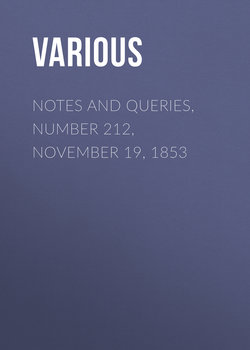Читать книгу Notes and Queries, Number 212, November 19, 1853 - Various - Страница 5
Notes
FOLK LORE
ОглавлениеAncient Custom in Warwickshire.—In Sir William Dugdale's Diary, under the year 1658, is noted the following:
"On All Hallow Even, the master of the family antiently used to carry a bunch of straw, fired, about his corne, saying,
'Fire and red low,
Light on my teen low.'"
Can any of your readers learned in ancient lore explain the custom and the meaning of the couplet, well as its origin? Does it now at all prevail in that county?
J. B. Whitborne.
Nottinghamshire Customs.—1. The 29th of May is observed by the Notts juveniles not only by wearing the usual piece of oak-twig, but each young loyalist is armed with a nettle, as coarse as can be procured, with which instrument of torture are coerced those unfortunates who are unprovided with "royal oak," as it is called. Some who are unable to procure it endeavour to avoid the penalty by wearing "dog-oak" (maple), but the punishment is always more severe on discovery of the imposition.
2. On Shrove Tuesday, the first pancake cooked is given to Chanticleer for his sole gratification.
3. The following matrimonial custom prevails at Wellow or Welley, as it is called, a village in the heart of the county. The account is copied from the Notts Guardian of April 28, 1853:
"Wellow. It has been a custom from time immemorial in this parish, when the banns of marriage are published, for a person, selected by the clerk, to rise and say 'God speed them well,' the clerk and congregation responding, Amen! Owing to the recent death of the person who officiated in this ceremony, last Sunday, after the banns of marriage were read, a perfect silence prevailed, the person chosen, either from want of courage or loss of memory, not performing his part until after receiving an intimation from the clerk, and then in so faint a tone as to be scarcely audible. His whispered good wishes were, however, followed by a hearty Amen, mingled with some laughter in different parts of the church."
I do not know whether any notices of the above have appeared in "N. & Q.," and send to inquire respecting 1. and 3. whether a similar custom holds elsewhere; and whether 2. has any connexion with the disused practice of cock-shying?
Furvus.
